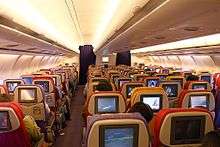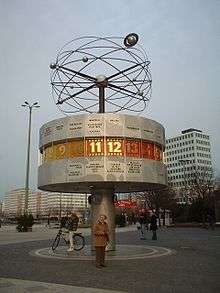Jet lag
Jet lag is a form of disorientation and fatigue caused by abruptly switching to a different sleeping/waking schedule and different daylight hours. It is caused by rapid travel across time zones.
Cause and severity of jet lag

Some people are affected more than others, but it tends to happen when crossing two or more time zones in a single flight (which first became commonplace with the development of commercial jet air travel, hence the term).
Jet lag is also compounded by the fact that long hours spent on a plane can cause you to sleep too much, or not enough, possibly at the wrong time of day relative to where you departed from. The fatigue from travelling, plus the mismatch with local time, can leave you ready to fall asleep just after lunch, or being wide awake in the middle of the night, knowing that dawn is still several hours away.
It doesn't follow that the greater the time difference between your origin and destination, the greater the jet lag. Often a short 4-5 hour difference that causes you to wake at 2AM at local time (or need to get up at 2AM of your home time) can be more fatiguing, and take longer to overcome than a complete reversal of day and night.
The maximum possible jet lag between two points is 12 hours; e.g. between Helsinki and Honolulu in either direction. If you travel across the International Date Line, subtract the time zone difference from 24 to get the correct time difference. For example, an "18-hour time difference" would equal 6 hours of jet lag.
|
Jet lag vs. travel fatigue Traveling is often tiring even if you don't move at jet speeds and don't cross any timezones. That long flight across the entire length of Africa is going to leave you tired from being in a crowded, dry, uncomfortable space with hundreds of strangers for most of a day. Travel fatigue is a real problem – just not exactly the same problem as jet lag. The traveller with jet lag usually has both of these problems. |
Where flying is concerned, it isn't the length of the flight that matters... only the difference in time zones. A flight from Paris to Johannesburg, while it might take you about 11 or 12 hours, wouldn't leave you very jet lagged because there's only 1 hour time difference. A flight from New York to Tokyo, on the other hand, leaves you with a 13- or 14-hour difference (the former if Daylight Saving Time is in effect in the US), which effectively means reversing your sleep/wake schedule.
Short or medium-length flights from east to west, where you gain a few hours, are usually a bit easier, as most people find it easier to stay up a little later than to go to bed earlier. But that only works within about 4 or 5 hours difference. Though, this varies from person to person; others might not have much problems when traveling east but feel awful when going the same number of time zones west. It is possible to get a 1 hour difference jetlag.
If you have yet to choose your destination, you can minimize jetlag by looking within the same or a nearby time zone. This limitation will not trap you on one continent; for instance, travel between Europe and Africa rarely changes the clock more than one hour. Slower methods of long-distance travel, such as by train or boat entirely eliminate jet lag or at least greatly reduces it, but at the cost of more time spent in transit for any given (large) distance.
Nominal time zones set aside, countries can have very different customary schedule for work, dining and store openings. While office workers in countries such as China are used to start the day early as 8 AM, people in Spain and other parts of southern Europe have a justified reputation for late-night dining.
Preparing for time zone travel
|
Boeing 787 Dreamliner Some airlines have been flying the 787 Dreamliner, a new aircraft from Boeing, since 2011. This advanced aircraft has additional features that reduce the effects of jet lag, including an enhanced air filtration system and specialized ambient lighting. If you are able to fly on this aircraft, it may help. |
You can't avoid jet lag completely, but you can make things easier on yourself by not fighting it. As soon as you can, forget your origin timezone and live by the destination time. If you should be sleeping during your flight to arrive in the morning, then ignore time zones, movies and entertainment, and just sleep whenever you can. If you will arrive in the evening and should stay awake while traveling, make sure you have activities, entertainment, caffeine, etc., to keep yourself awake during the flight.
Schedule around it
With large time differences (particularly if you're traveling west), you will probably wake up extremely early after your first night — possibly as early as 3AM! You should do your best to go back to sleep, at least for a few hours, but since you're going to wake up early anyway, you might as well take advantage of it. Plan activities for your first morning or two that take advantage of being up early. (For example, American travelers can check out the Toyosu Market in Tokyo and get a sushi breakfast, or hike up Diamond Head in Hawaii to watch the sunrise, while someone from Europe can enjoy the sunrise somewhere in the Rocky Mountains).
On the other hand if you're traveling east, you might find it difficult to fall asleep before it's already morning. This can be turned to your advantage if you enjoy late-night partying. Nevertheless, during the first few days at the new destination it's not a smart idea to drink too much alcohol — your head will already be messed up by the time difference! Finally, if you've slept badly during the overnight flight, or if your trip was particularly long or awful, it's possible that you're tired enough to easily fall asleep at the local bedtime the very first night, but might have problems during the following ones.
Also, knowing sunrise sunset times in your destination time can help in figuring out when to seek daylight and darkness to help aid in the transition process. In each time zone, sunrise sunset times can occur at significantly different times in different parts of the time zone, depending on time of year and your location within the timezone. As such, the destination's day/night cycle can be a shock from the day/night cycle you're used to back home.
Other tips
If you know that you'll be getting up earlier or later, try making part of that change before your departure. Can you go to sleep an hour earlier (or sleep in an hour later) every night for the week just before your flight?
Some scientific research suggests that fasting (not eating) can help to overcome jet lag by resetting the body's circadian rhythm (biological clock). Not eating 24 or more hours prior to arriving at your destination contributes to feeling less tired once arrived. The light/dark cycles of the earth affect our circadian rhythms, but so do our eating patterns. Rebooting our feeding cycles can mitigate the time warp.
Recovering from jet lag
- See also: Returning home

Recovering from jet lag is a process that, well, takes time. A rule of thumb is that you recover about 1 hour difference per day. You may find that on your way out, you are fine after just a couple of days, but you will really notice the recovery period on your way home, particularly if you didn't stay long enough to fully adjust to the original time difference. At that point your body clock will be really confused and it will take a while for it to sort things out.
You can aid the process a bit by helping to reset your body clock. Sunlight plays a big factor in this and it helps that the sun is out on your first day. Try to operate on your new local time as early as possible. If you're going to land early in the day, try to sleep on the plane so you arrive refreshed and ready for a full day of activity. Conversely, if you're going to arrive near the evening, try to stay awake on the plane so that you'll be tired when you arrive and can get a lengthy sleep. As much as possible, spend the daylight hours first few days in your new time zone outdoors.
Attempt to have a normal day in terms of the time zone you've flown into. If you land at 7AM, for example, you will probably have been served breakfast on your flight, so head to your accommodation (ask if they can mind your luggage if you aren't travelling light), and go and see some of the sights, making sure to get daylight and fresh air. You'll feel tired, particularly by the mid-afternoon, but keep pushing on until an early dinnertime. Eat dinner and then go to bed. You should be tired enough for a good night's sleep.
Alternatively, if you don't sleep well on planes and arrive at your destination early in the morning, consider getting a "day use" hotel room in order to sleep for just a few hours and shower before continuing on the rest of the day. Having only slept a few hours, you will still be tired by evening, so you will have adjusted to the local time by the next day.
It is a lot easier to reset your day/night circle if you eat immediately after getting up. Therefore skipping breakfast is not a healthy option the first couple of days after you arrive in a new timezone.
Melatonin is a hormone secreted by the pineal gland in the brain where it regulates sleep. In the United States, melatonin tablets are widely sold over-the-counter in stores with other supplements such as vitamins and minerals. Many countries require a doctor's prescription, however. Dosages vary wildly from one-half milligram to ten milligrams. Some people have found it to be helpful in adjusting to jet lag by taking a tablet just before the new and awkward bedtime. More than a few seconds of viewing light destroys your body's melatonin, including the melatonin taken as a supplement, so especially if you have taken melatonin on an empty stomach, be ready to turn off the room lights and electronic displays for the night after taking it.